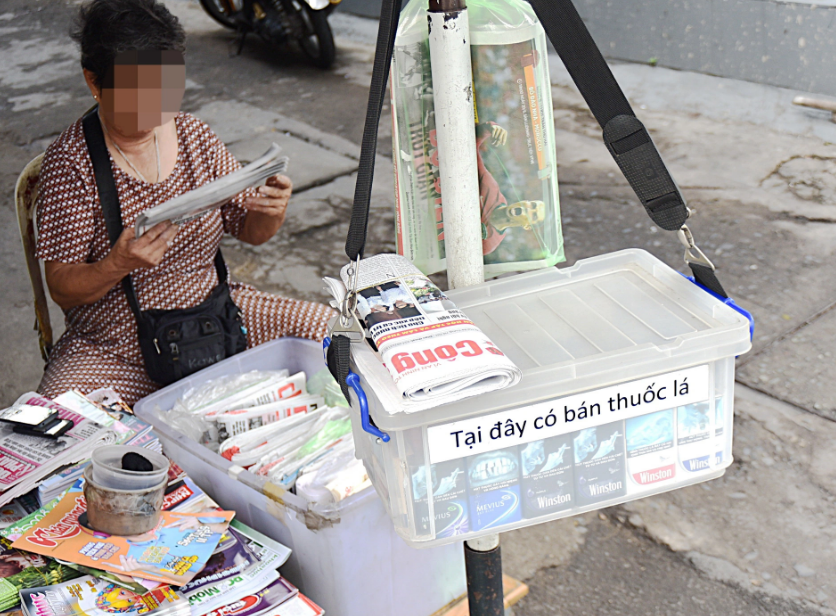The Vietnamese government has proposed slapping a higher excise tax on cigarettes in a draft revising the Law on Excise Tax that will be submitted to the lawmaking National Assembly at the ongoing eighth sitting, which kicked off on Monday, amid high smoking rates.
The revised Law on Excise Tax is set to be passed in May next year.
The bill focuses on curbing the deadly habit in Vietnam as the country saw up to four billion packs of cigarettes consumed each year among over 15 million Vietnamese smokers, according to statistics issued in 2021.
In 2023 alone, 5.3 billion packs of cigarettes were produced locally.
Medical experts have raised concerns over the serious public health impacts of smoking, which contributes to a growing number of health-related issues.
To address these challenges, increasing the excise tax on cigarettes is seen as a crucial step in the fight against smoking and its associated health burdens.
Low-cost cigarettes seem to encourage smokers
The current excise duty on tobacco in Vietnam is 75 percent of the factory price.
The government proposed two solutions for reducing cigarette consumption by keeping the excise tax unchanged in both cases, but each of them will undergo two different road maps for an absolute rate.
The first solution includes an additional tax of VND2,000 (US$0.07) a pack, starting from 2026. From 2027 to 2030, the tax will be revised up by VND2,000 per pack annually. By 2030, the absolute rate will reach VND10,000 ($0.4) per pack of cigarettes.
As for the second solution, if the amended Law on Excise Tax takes effect in 2026, with the 75-percent tax kept unchanged, the unhealthy product will be subject to an absolute rate of VND5,000 ($0.19) per pack.
Annually, the tax will increase by VND1,000 ($0.03) per pack until 2030, then the absolute rate will be raised to VND10,000 ($0.4) per pack.
These solutions had previously been carefully considered based on the prices of cigarettes in Vietnam to align with the population's income.
The government also expressed a strong preference for the second solution that is believed to cut cigarette consumption effectively.
The Vietnam Steering Committee on Smoking and Health has identified strokes, coronary artery disease, chronic obstructive pulmonary disease, and lung cancer as the leading causes of death among smokers.
A recent report from the Vietnam National Cancer Hospital showed that the percentage of smokers among patients with lung cancer was 96.8 percent.
Dr. Nguyen Huy Quang from the Vietnam Medical Association stressed that increasing the excise duty on cigarettes is necessary as the product is harmful to public health.
The spike is meant to solidify efforts in reducing tobacco consumption. If the price rises by 10 percent following the higher tax, he predicts cigarette users will drop by five-eight percent.
Strong support for tax increase
The Ministry of Health, the World Health Organization (WHO), the World Bank, and some health protection organizations have thrown their support behind the proposed excise tax hike.
Some brought forward a third solution for consideration with an even steeper tax rise.
Specifically, apart from the 75-percent excise tax, the additional duty of a pack of cigarettes must be VND5,000 in 2026, VND7,000 in 2027, VND10,000 in 2028 and stand at VND15,000 in 2030.
Dr. Angela Pratt, a representative of WHO in Vietnam, assessed that the Southeast Asian nation has made great strides in the fight against cigarettes over the past decade.
However, Vietnam remains among the countries with the highest smoking prevalence, with more than 15 million smokers.
Pratt attributed the high smoking rate in Vietnam to the low price of cigarettes, a result of low taxes.
Currently, taxes account for only 36 percent of the retail price of cigarettes in Vietnam, significantly lower than the global average of 62 percent.
WHO recommends that tobacco taxes should make up at least 75 percent of the retail price to effectively discourage smoking.
In addition, it is easy and affordable to buy cigarettes in Vietnam, while residents’ incomes are on the rise.
Dr. Pratt said that raising the excise tax and prices on cigarettes is the most effective way to shrink consumption.
Dr. Nguyen Tuan Lam, an anti-smoking expert at WHO's Vietnam office, expressed concern over the high number of tobacco smokers in the country.
Meanwhile, Hoang Thi Thu Huong, from the Ministry of Health's Department of Legal Affairs, pointed out that most Southeast Asian countries have adopted either an absolute or mixed tax system on tobacco products.
However, Vietnam and Cambodia are among the few still using a proportional tax model, which is less common in the region.
Nguyen Van Duoc, general director of Trong Tin Accounting and Tax Consulting Company, aired his support for a surge in the excise tax on cigarettes, explaining that the product might lead to a series of diseases and affect not only smokers but also others.
He noted that a steep tax on cigarettes is already happening globally.
Apart from the increase in the excise tax on tobacco, it is vital to popularize the negative impacts of cigarettes and call on residents, especially the younger generation, not to smoke, Duoc said.
He warned that increasing the duty on cigarettes may result in more tobacco smuggling in Vietnam, so designated forces should tighten control over cross-border cigarette trafficking.
Nguyen Thai Son, an expert on taxation, asserted that this hike should primarily undergo a detailed road map so that tobacco firms can actively plan their business.
He agreed the nation should raise awareness of smoking health risks and adopt drastic measures to prevent cigarette trafficking.
Effects of smoking prevalence
Statistics from the Vietnam Directorate of Market Surveillance under the Ministry of Industry and Trade indicated that cigarette smuggling became complicated during the 2019-23 period, with over 59,600 tobacco trafficking rings broken up.
During the time frame, Vietnamese police seized 37.5 million illegal packs of cigarettes.
Smuggling also caused an annual loss to the nation’s tax collection of VND5-6 trillion ($196-236 million) from 2019 to 2023.
Smoking also puts pressure on Vietnam's medical system with over 40,000 deaths linked to cigarettes each year.
The annual cost for treatment associated with smoking-related diseases averages out at VND108 trillion ($4.2 billion).
|
|
| A young man is pictured vaping in Ho Chi Minh City. Photo: Quang Dinh / Tuoi Tre |
Increased concerns over vape popularity
According to data from the Vietnam Steering Committee on Smoking and Health, the smoking rate among adult men in Vietnam dropped to nearly 39 percent in 2023 from 54 percent in 2013.
The nation reported a significant fall in the smoking percentage among the youth.
However, Vietnam is now being challenged by the popularity of e-cigarettes and vapes.
In particular, the number of women and young people reporting using either is steadily climbing up. The rate of students aged 13-15 vaping slipped from 3.5 percent in 2022 to eight percent in 2023.
Dr. Nguyen Trung Nguyen, director of the Bach Mai Poison Control Center in Hanoi, said that the center had admitted several patients in a state of multi-organ failure and poisoning after using e-cigarettes.
In 2023, all medical facilities and hospitals nationwide treated 1,224 patients with diseases linked to e-cigarettes.
Over the past two years, the Ministry of Health, with the assistance of experts and doctors, has implemented a range of measures to combat the negative impacts of e-cigarettes.
The Ministry is considering a plan to ban new-generation tobacco products, including vapes, e-cigarettes, and heated tobacco.
This move would put Vietnam on a par with several Southeast Asian countries, such as Thailand, Singapore, Laos, Brunei, and Cambodia, all of which have already prohibited e-cigarettes.
Like us on Facebook or follow us on Twitter to get the latest news about Vietnam!





















































